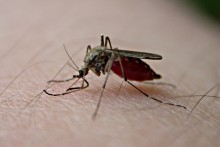
Geneva, 11 July 2014 – Detailed results from the world’s first ever large-scale phase III clinical trial for a dengue fever vaccine were published in the journal the Lancet today. The findings suggest that the three-dose vaccine, developed by Sanofi Pasteur, may be capable of reducing cases of dengue fever by 56.5% and dengue haemorrhagic fever, a more severe form of dengue, by up to 88.5%.
“This brings us a step closer to making dengue fever a vaccine-preventable disease,” said Dr Seth Berkley, CEO of the GAVI Alliance. “Given these encouraging results this vaccine has the potential to provide some of the most vulnerable children with protection from a devastating and deadly disease.”
Dengue fever is currently the second most prevalent vector-borne disease, posing a threat to nearly half the world’s population. Like malaria the disease is transmitted via mosquito bites. Each year there are as many as 100 million cases of dengue fever, with 500,000 cases of dengue haemorrhagic fever and an estimated 20,000 dengue-related deaths.
According to Sanofi, the study, conducted in Indonesia, Malaysia, the Philippines, Thailand and Vietnam on more than 10,000 children aged between 2-14 years old, also showed a 67% reduction in dengue-related hospitalisations. It also revealed a much higher burden of disease than expected, with one in 20 children in the control group suffering from dengue each year, three times higher than anticipated. The study also found that the vaccine provided strong protection against three of the four disease-causing strains, or serotypes, of the virus.
Dengue vaccines were not prioritised for GAVI Alliance support in the most recent five-year Vaccine Investment Strategy (2013) because of a relative lack of evidence on the burden of dengue in GAVI eligible countries and uncertainty at the time about the future availability of an effective vaccine. These new results are an important step forward and will prove critical for future decision-making processes. GAVI will continue to monitor developments, in particular results from the second complementary Phase III study by Sanofi involving more than 20,000 subjects in Latin America.
